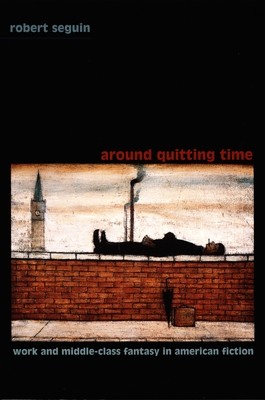
- We will send in 10–14 business days.
- Author: Robert Seguin
- Publisher: Duke University Press
- ISBN-10: 0822326701
- ISBN-13: 9780822326700
- Format: 15.4 x 23 x 1.7 cm, softcover
- Language: English
- SAVE -10% with code: EXTRA
Reviews
Description
Virtually since its inception, the United States has nurtured a dreamlike and often delirious image of itself as an essentially classless society. Given the stark levels of social inequality that have actually existed and that continue today, what sustains this at once hopelessly ideological and breathlessly utopian mirage? In Around Quitting Time Robert Seguin investigates this question, focusing on a series of modern writers who were acutely sensitive to the American web of ideology and utopic vision in order to argue that a pervasive middle-class imaginary is the key to the enigma of class in America.
Tracing connections between the reconstruction of the labor process and the aesthetic dilemmas of modernism, between the emergence of the modern state and the structure of narrative, Seguin analyzes the work of Nathanael West, Ernest Hemingway, Willa Cather, John Barth, and others. These fictional narratives serve to demonstrate for Seguin the pattern of social sites and cultural phenomenon that have emerged where work and leisure, production and consumption, and activity and passivity coincide. He reveals how, by creating pathways between these seemingly opposed domains, the middle-class imaginary at once captures and suspends the dynamics of social class and opens out onto a political and cultural terrain where class is both omnipresent and invisible.
Aroung Quitting Time will interest critics and historians of modern U.S. culture, literary scholars, and those who explore the interaction between economic and cultural forms.
EXTRA 10 % discount with code: EXTRA
The promotion ends in 18d.12:16:52
The discount code is valid when purchasing from 10 €. Discounts do not stack.
- Author: Robert Seguin
- Publisher: Duke University Press
- ISBN-10: 0822326701
- ISBN-13: 9780822326700
- Format: 15.4 x 23 x 1.7 cm, softcover
- Language: English English
Virtually since its inception, the United States has nurtured a dreamlike and often delirious image of itself as an essentially classless society. Given the stark levels of social inequality that have actually existed and that continue today, what sustains this at once hopelessly ideological and breathlessly utopian mirage? In Around Quitting Time Robert Seguin investigates this question, focusing on a series of modern writers who were acutely sensitive to the American web of ideology and utopic vision in order to argue that a pervasive middle-class imaginary is the key to the enigma of class in America.
Tracing connections between the reconstruction of the labor process and the aesthetic dilemmas of modernism, between the emergence of the modern state and the structure of narrative, Seguin analyzes the work of Nathanael West, Ernest Hemingway, Willa Cather, John Barth, and others. These fictional narratives serve to demonstrate for Seguin the pattern of social sites and cultural phenomenon that have emerged where work and leisure, production and consumption, and activity and passivity coincide. He reveals how, by creating pathways between these seemingly opposed domains, the middle-class imaginary at once captures and suspends the dynamics of social class and opens out onto a political and cultural terrain where class is both omnipresent and invisible.
Aroung Quitting Time will interest critics and historians of modern U.S. culture, literary scholars, and those who explore the interaction between economic and cultural forms.


Reviews